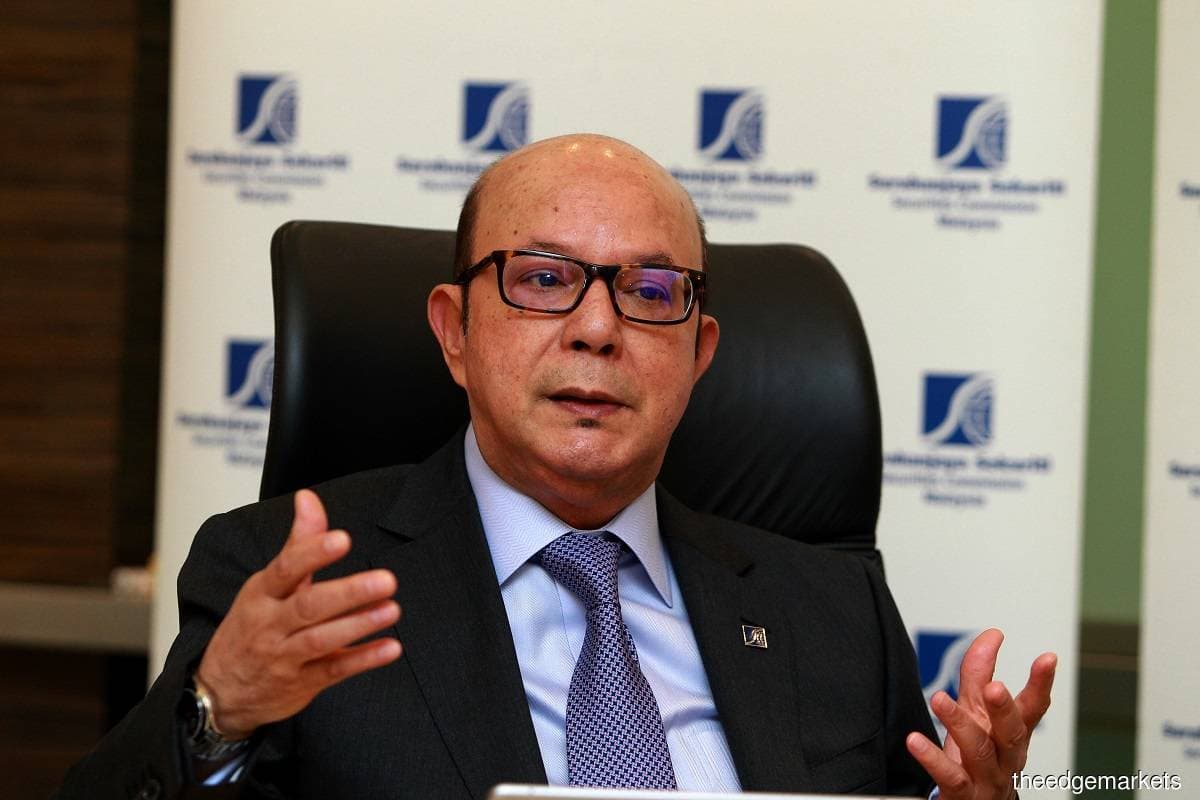
KUALA LUMPUR (Feb 24): The Islamic Capital Market (ICM) can play a crucial role in helping the country recover from the Covid-19 pandemic and provide avenues to achieve the Sustainable Development Goals (SDGs), according to Securities Commission Malaysia (SC) chairman Datuk Syed Zaid Albar.
Malaysia, as an established leader in Islamic finance, is well positioned to showcase the benefits of combining environmental, social and governance (ESG) with shariah, he said in his welcome address at the SC-UNDP International Islamic Finance Conference on Thursday (Feb 24).
“Both Islamic finance and sustainable and responsible investment, or SRI, share positive principles and values such as social responsibility, inclusiveness, equitable sharing of risks and shared societal benefits, among others. This in essence clearly demonstrates ICM products and instruments as a natural fit to support the SDGs, and of course the overall sustainability,” he said.
Globally, Islamic finance assets are expected to reach US$3.7 trillion (RM15.54 trillion) in 2024, Syed Zaid said. Malaysia continues to lead the sukuk market with about 45% of the world's outstanding sukuk.
“It is also one of the top three jurisdictions for Islamic funds, accounting for over 29% of total global AUM. As of January 2022, close to half of 44 SRI funds registered domestically were Islamic. As you can see, the ICM accounts for over 60% of Malaysia’s total capital market. On sustainability, we have pioneered the green sukuk and the social impact sukuk through SC’s SRI sukuk framework,” he noted.
Syed Zaid said Maqasid al Shariah or the aims of shariah emphasise a holistic view of life in Islam that promotes the attainment of benefit and the avoidance of harm to people. This includes inclusion and facilitating investment for the common good, which are also integral in the SDGs.
“In meeting the SDGs, Maqasid al Shariah should be the foundation for all business transactions and activities... Sukuk, for example, has far-reaching effects in achieving both social and green goals. Sukuk issued under the SC’s SRI Sukuk Framework have financed a variety of green, social and sustainable projects, which include quality education, and affordable and clean energy,” he said.
Moreover, Islamic teachings clearly emphasise sustainability as an important social agenda, the chairman said.
“Combined with social finance, it can assist in creating employment, protecting livelihoods, ensuring greater equality and alleviating poverty. Islamic social finance instruments such as Zakat, Sadaqah and Waqf also promote inclusive and sustainable economic growth.
“This is important, as a UNDP study found that less developed economies can outperform pre-Covid trajectories by investing in an ‘SDG Push’. Malaysia has identified the Waqf segment as an innovative social development tool. Having led the way in facilitating the world’s first Waqf IPO, the SC launched the Waqf-featured fund framework in 2020. This has undoubtedly broadened the range of innovative ICM products and provided investors access to socially impactful activities.
“We, at the SC, have also engaged with the Malaysian government to develop the National Wakaf Master Plan to strengthen Waqf management and further develop Malaysia’s Islamic economy,” he noted.
Looking ahead, Syed Zaid said, impact investing is another growth avenue for ICM. “By integrating impact assessments with Islamic social finance instruments, investors will be able to measure its payoffs and outcomes. This also aligns with Islam's views on reinvesting profits back into society,” he added.
Islamic finance is poised to scale up value-based finance solutions
Bank Negara Malaysia (BNM) deputy governor Datuk Abdul Rasheed Ghaffour said Islamic finance is ready to develop value-based financial solutions and continue to take the lead to have a greater impact on the environment, economy and society.
“The Covid-19 pandemic offers a proverbial 'reset button' for nations to rebuild the economy and society with greater resilience and preparedness. This means leveraging this moment towards building pathways for long-term sustainability and inclusive growth with the seventeen SDGs as our guiding compass. This need is even more pressing now with 2030 SDG targets looming over the horizon and a financing gap of US$4.5 trillion per annum.
“I see Islamic finance having a major role in plugging this gap. Most, if not all of the seventeen SDGs are aligned with the objectives of Shariah (Maqasid Shariah), making Islamic finance naturally advance and spearhead sustainability goals. This is the case in Malaysia, where sustainability objectives are materialised through the adoption of Value-based Intermediation, or VBI, practices,” he said in his keynote address.
Abdul Rasheed said Islamic financial institutions have contributed significantly to domestic sustainability efforts for several years.
“Collectively, the Islamic financial institutions in Malaysia have intermediated over RM155.6 billion in VBI-aligned initiatives over the past three years. Being a mature system today, Islamic finance is poised to scale up value-based finance solutions and continue to take the lead to create greater impact on the environment, economy and society,” he added.